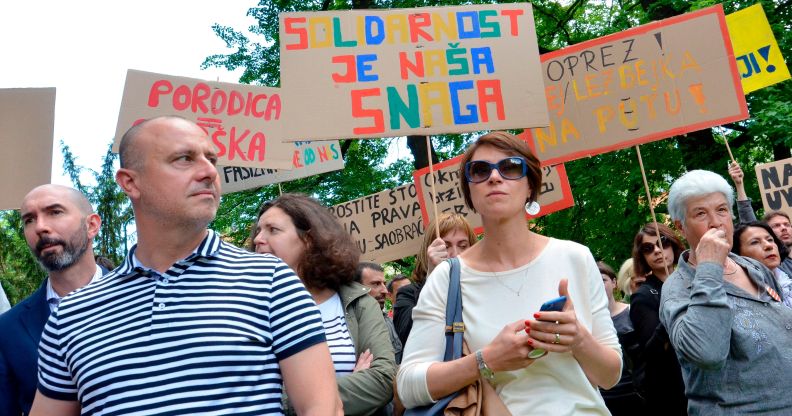Bosnia set to host first ever LGBT Pride

Demonstrators carry a sign reading “Solidarity is strength” during a protest by LGBTI community members on May 13, 2017 in Sarajevo.
Bosnia and Herzegovina will hold its first Pride event in the capital Sarajevo later this year, drawing members of the LGBT+ community from all over the country.
Speaking to a news conference in the city, one of the organisers Branko Culibrk said: “Bosnia will finally have its Pride march that will be held on 8 September in Sarajevo.
“The march will be a manifestation against inequalities and against violation of LGBTIQ (lesbian, gay, bisexual, transgender, intersex and questioning) peoples’ rights,” he added.
Another organiser, Dajana Bakic, said: “Pride marches take place everywhere in the region.
“The climate has generally changed and we expect that a large number of citizens will come to show solidarity with us.”
LGBT rights in Bosnia
Until 1998, being homosexual was a crime in the largely conservative country.
Although Bosnia passed anti-discrimination laws that included LGBT+ rights in 2016, the country does not recognise rights for same-sex couples.

Bosnian LGBT+ activists hold signs reading “I have nothing to be ashamed for” and “Violence is forbidden” during a protest in 2017 (ELVIS BARUKCIC/AFP/Getty Images)
Several past attempts to host events in support of LGBT+ rights have ended in violence.
In 2008, a cultural festival in Sarajevo was targeted by hooligans who threw rocks at attendees and in 2014, masked men forced their way into the LGBT-friendly Art Kriterion cinema and attacked people during a queer film festival.
A similar incident occurred in 2016, when several men entered the cinema shouting anti-LGBT slurs.
A 2017 survey conducted by the Sarajevo Open Centre found that safety is a huge concern for LGBT+ people.
Around 69% feel unsafe attending public events or being in public spaces. Another 32% of gay men and 17% of lesbians have experienced violence because of their sexual orientation.
Other neighbouring countries in the Balkans have begun to host LGBT+ Pride events, including the Muslim-majority Kosovo.
Last year, hundreds of people turned out for the second Pride parade in Pristina.
Addressing the event, Kosovo’s Prime Minister Ramush Haradinaj commented on Facebook: “Our constitution guarantees individual freedom for all.
“LGBT and Pride Week will always have institutional support, to be free and secure to express their orientation.”

